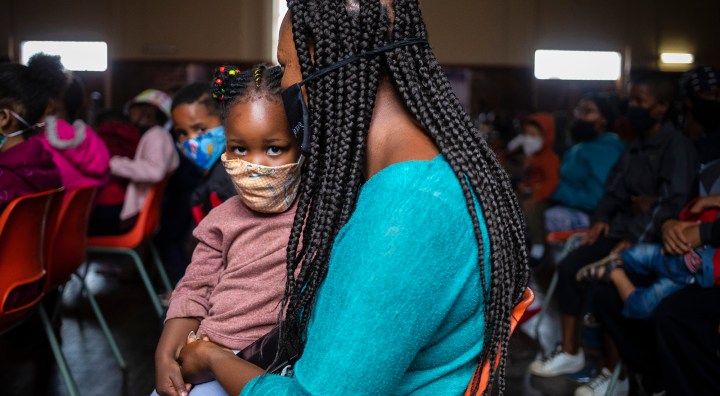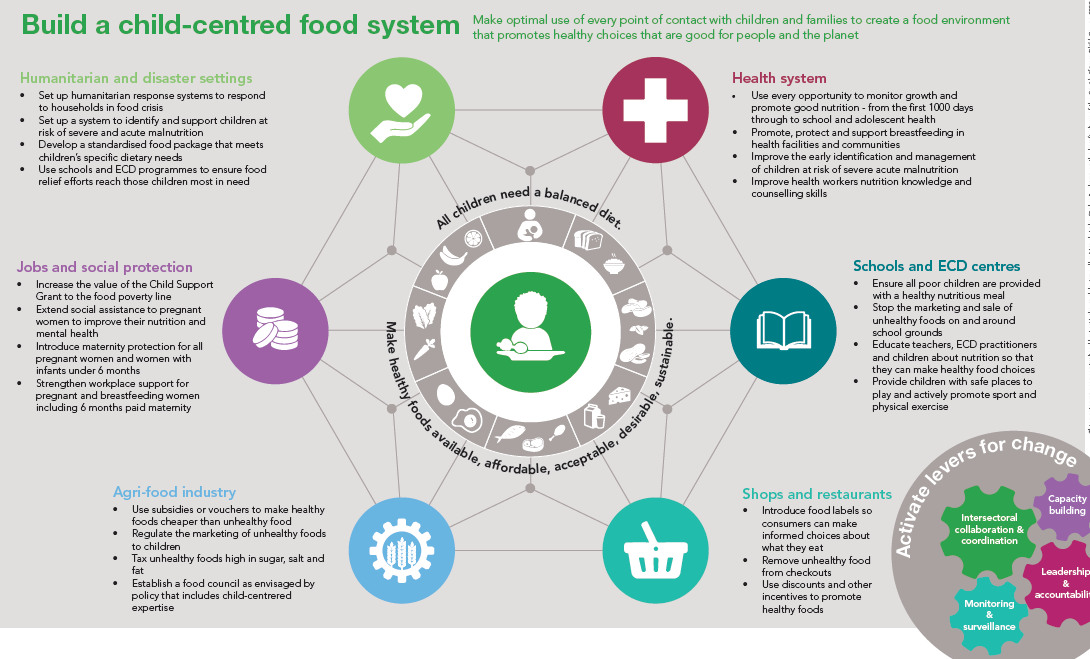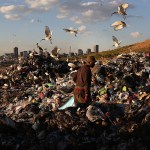ISS TODAY
South Africa needs to address its food and nutrition crises to realise growth

Economists and business analysts working on the country’s unemployment crisis must prioritise children’s access to affordable, healthy food.
First published by ISS Today.
Chandré Gould, Senior Research Fellow, Justice and Violence Prevention, ISS Pretoria.
As South Africa grapples with overcoming the challenge of massive Covid-19-related job losses and the highest unemployment level in the world, we need to think long-term to avoid remaining in this situation.
The First Lady, Dr Tshepo Motsepe, has thrown her weight behind efforts to promote breastfeeding for several years, because this is a vital component of ensuring that infants get the nutrients they need. But breastfeeding is unlikely to be at the top of the list of issues being considered by economists and business analysts working to address our current crisis. Fixing a deeply broken food system should be. This is why.
Two-year-old Shanique Mooi’s mother Annik drops her off at the local crèche every morning before she walks three kilometres to her job as a domestic worker. Shanique’s mid-morning snack is a packet of chicken-flavoured Spookies — a cheap puffed maize chip covered with colourants, flavourants and preservatives. This is what most of the children who attend the only crèche in town will eat.
Annik is lucky — Shanique is one of the 60 children who have a place at the crèche. Most parents in her small community rely on neighbours to watch their children during the day so that they can go to work. If they are fortunate and have lived in the area for a long time, perhaps an extended family member can help out.
Soon after arriving at the somewhat dilapidated crèche, after being insulted by the teacher who doesn’t like it when she cries as her mother leaves her, Shanique is given a bowl of congealed yellow starchy porridge for her breakfast. The porridge and the packet of chips, that her teacher eats half of, are all she will eat until her mother collects her at 3.30 that afternoon.
That diet is not enough to give Shanique the energy she needs to learn or enough fuel for her small body to grow. But it is the only prepared food that her mother can afford, and that is available for her to buy at the local spaza shop. It’s also what all the other children have, and no one likes to stand out.
Like most children her age, Shanique often gets sick, her nose runs, and she gets a post-nasal drip. This inflames her stomach lining and then she doesn’t want to eat at all. The less she eats, the longer her body takes to fight off the infection, and the longer she feels miserable and can’t concentrate. When she finally gets well, it’s not for long because her weakened body is susceptible to opportunistic infections.
Nothing she experiences prepares her for a future in which she will escape the poverty she has grown up with. Like the other 27% of children under five in South Africa whose development is limited by poor nutrition, her experiences condemn her to a life of struggle. The 2020 edition of the South African Child Gauge correctly terms this “slow violence”.
This slow violence starts even before children are born. Institute for Security Studies Researcher Thandi van Heyningen’s PhD research found that food insecurity was one of the factors contributing to high rates of depression and suicide in pregnant women in South Africa. This has a direct impact on children’s mental health, education outcomes and physical health.
A child-centred food system

(Source: South African Child Gauge 2020 © Children’s Institute, University of Cape Town)
There are many reasons why children like Shanique, and their parents, should be at the forefront of discussions about what we need to do to fix our country. First, this is a question of rights that should be realised, and an imperative for achieving social justice. But it is also the problem that will continue to confound every minister of finance, labour, trade and industry and education for the next 20 years.
Shanique has little chance of developing the soft or hard skills needed for our economy to grow unless she gets nurturing care, stimulation, healthcare and healthy food during her childhood.
She will probably not be equipped to help solve the complex problems we will face in the coming years, and there is little doubt that her income will have to be supplemented by state grants. What she needs cannot be fixed by skills training or youth employment schemes that might be available to her later in her life.
South Africa simply cannot afford to ignore the daily crisis of food insecurity faced by children and their parents. Doing so means that we will never climb out of the trouble we find ourselves in now. We have to ensure that parents like Annik can buy or at least get access to a diversity of affordable nutritious food at their local spaza shops.
This means that the state, agri-business, economists, and planners must figure out how to make fresh, quality produce available and affordable to mothers like Annik. The 2020 Child Gauge makes a number of practical recommendations to address the problem. Cabinet would be wise to consider them and make this a priority. DM
This article is based on a real case, but the names have been changed.
Chandré Gould, Senior Research Fellow, Justice and Violence Prevention, ISS Pretoria.


















 Become an Insider
Become an Insider
Comments - Please login in order to comment.